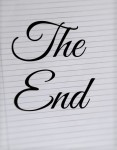
Thanks for visiting my blog! I’ve moved the action over to my new website, and I’d love to have you visit. While you’re here though, feel free to have a look through my posts. You can follow me on Twitter and like my … Continue reading


Thanks for visiting my blog! I’ve moved the action over to my new website, and I’d love to have you visit. While you’re here though, feel free to have a look through my posts. You can follow me on Twitter and like my … Continue reading

Once you’ve set your writing goals (you can read more about the importance of that here), you’re going to have to find ways to stick to them. Here are three simple ones that have helped me 1. Schedule it in Your … Continue reading

When I was writing my first book, I was still studying and had three part-time jobs. Fortunately, being a fast worker meant that I had a lot of time in those jobs that I used for writing. I had a vague idea … Continue reading

When I had my wisdom teeth removed a few months ago, I discovered The Mindy Project*. I felt like it had been written for my enjoyment, despite the fact that I often found the main character Mindy’s actions and habits … Continue reading
Before I heard about my publishing contract, I often used to feel guilty for spending time on writing. I would think about all the things that needed to be done, and since my writing was something I did for me, it was easy to set it aside for another, “more convenient” time. Now my writing time is justified because it’s work time. It’s a job that will help me to earn a living, and I have deadlines to keep…guilt free.
It’s easy to say that you should make time for writing, but you actually have to write for it to be effective. It’s not as simple as it sounds. Around the same time that I heard about my book, I also took on another freelance project, which meant a third job, early mornings and late evenings.
Though I have deadlines for my writing, they’re not as immediate as those for my other two jobs. For a few days I gave into the temptation of focusing on my other work, but I couldn’t stop thinking about writing. My characters and word counts wouldn’t leave my mind. And that’s when I realised that writing is my job now, so making time for it is just as important as the other things I have to do.
In the same way you need to talk about a day at work, you’ll need to talk about your writing. Perhaps even more so because writing is such a solitary activity. Whenever my husband or friends ask me about how my writing is going, I gladly tell them (in more detail than I think they might have wanted to know). Because you can have a bad day while writing, too…sometimes your characters annoy you in the same way a colleague can, and you don’t get nearly as much done that day as you would have liked to.
But even though writing is a job for me now, it’s definitely one I enjoy and appreciate more than any other I’ve had!
Do you write for a living? How has your life changed since it’s become your job?

…is that they come true. The day I last posted a blog entry was the day I heard that Harlequin was going to publish my book (you can read about that here). I’m absolutely thrilled, of course. The dream that I’ve … Continue reading
I’ve been working quite hard on making my dreams come true over the last few months. I’ve worked on revising old ideas, started writing new books, and tried to blog about my experiences. I’ve also been doing freelance work while actively seeking more to help pay the bills.
Not that I thought it would be clear sailing, of course. But you only truly realise the sacrifice it takes to follow your dreams when you’re faced with a leaking roof in your house. When you think about how if you worked a 9-to-5, maybe that leak wouldn’t seem so daunting. When you think about how much more you would like to contribute to your household. When you wish that your life was already where you’d like it to be.
Being in that situation makes you realise how much support means. An encouraging word about following your dreams from a friend can make a slow day not seem like a waste. A like on a blog post or a retweet from a stranger can be the thing that makes you think that maybe, just maybe, what you’re doing isn’t crazy. That maybe the sacrifice is worth it.
I’ve actively tried to read fellow writers’ blogs, vote on competitions where required, retweet when widespread attention would help. I’ve sent messages of encouragement to friends and family who are trying to follow their dreams. And even to those who aren’t because they haven’t found what that dream is yet, or if they simply aren’t in that dream job.
Is this person doing something that makes them happy? Is following this path unconventional and not considered “safe”? Have they been making sacrifices to do it? If any of the answers to these questions are yes (and probably all of them are), I ask myself how I can help. If a share on Facebook, retweet on Twitter, read or like on a blog will help, I do it.

I started to read Jude Deveraux’s A Knight in Shining Armour after watching an inspiring (and funny) interview where she talked about how she found her inspiration for this book. But then my husband kidnapped my Kindle, so instead, I settled … Continue reading
While reading up on how to become a better writer, one of the pieces of advice that struck me was that I needed to read as a writer.
This meant that though reading is a big part of becoming a better writer in the role of a reader (blog post for this to follow soon!), it’s essential to read as a writer, too.
I love reading Nora Roberts’ books. And while it’s so easy for me to become lost in the world she has created, after reading this advice, I tried to take a step back and become more objective. I took note of what it was about her writing that made me enjoy her books as a reader. I realised that she creates immensely relatable heroines, likeable heroes and a plot that puts them together in ways that brings out the best and worst of these two characters.
If the heroine is a firefighter, the reader will know exactly what each day is like for her. Or if the hero is a caretaker, we’ll know just how much attention he pays to his charge. The details aren’t brushed over, which does wonders for the credibility of the book.
Well, now that I’ve read a Nora Roberts’ book as a writer, I can start using what I’ve learnt from her in my own writing. In others words, I will pay attention to making my main characters relatable and likeable, I will make sure my plot takes them on a journey that tests themselves as individuals and in their relationship, and I will pay more attention to detail.
Since I’m speaking about this is more general terms, it may be hard for you to understand what I mean. Which is why I thought I’d introduce a new category to my blog called “Reading for Writers”. What I aim to do with this is share with you what I’ve learnt as a writer from a specific book that I’ve been reading. It will be a kind of book review, from one writer to another.
I’m really excited about this idea, so I’ll be sharing my first Reading for Writers review in this week. Let me know what you think about this idea, and stay tuned for my next post!

Last week, I finished writing the first draft of my book (!). I didn’t post to my blog because I wanted my next post to start with that sentence. Because though “first draft” means that there will be a second, … Continue reading